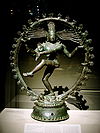The Mahamrityunjaya Mantra (Sanskrit: महामृत्युंजयमंत्र, महामृत्युञ्जयमन्त्र, romanized: mahāmṛtyuṃjaya-mantra, mahāmṛtyuñjaya-mantra, lit. 'Great death-defeating mantra'), also known as the Rudra Mantra or Tryambakam Mantra, is a verse (ṛc) of the Rigveda (RV 7.59.12). The ṛc is addressed to Tryambaka, "The Three-eyed One", an epithet of Rudra who is identified with Shiva in Shaivism. The verse also recurs in the Yajurveda (TS 1.8.6; VS 3.60).
The mantra
The Mahamrityunjaya Mantra reads:
- ॐ त्र्य॑म्बकं यजामहे सु॒गन्धिं॑ पुष्टि॒वर्ध॑नम् ।
उ॒र्वा॒रु॒कमि॑व॒ बन्ध॑नान्मृ॒त्योर्मु॑क्षीय॒ माऽमृता॑॑त् ।।
- oṃ tryàmbakaṃ yajāmahe sugándhiṃ puṣṭi-várdhanam ।
urvārukám iva bándhanān mṛtyór mukṣīya mā́ 'mṛ́tāt ।।
Translation by Jamison and Brereton:
- "We sacrifice to Tryambaka the fragrant, increaser of prosperity.
Like a cucumber from its stem, might I be freed from death, not from deathlessness."
Origin
The mantra first appears in Rigveda 7.59.12, which is a composite hymn attributed to Vasiṣṭha Maitrāvaruṇi. The last four verses (in which the Mahamrityunjaya Mantra is found) are late additions to the hymn, and they make references to the Sākamedha, the last of the four-monthly rituals. The Sākamedha ends with an oblation to Rudra Tryambaka, which is why the last verse of the four is addressed to Tryambaka.
Significance
Hindus believe the mantra is beneficial for mental, emotional, and physical health and consider it a moksha mantra which bestows longevity and immortality.
It is chanted while smearing vibhuti over various parts of the body and utilised in japa (mantra repetition) or homa (religious offering ceremony).
See also
References
- Anantashastri; et al. kr̥ṣṇa-yajurvēdīya taittirīya-saṁhitā कृष्ण-यजुर्वेदीय तैत्तिरीय-संहिता [Taittiriya Samhita of the Krishna Yajurveda] (in Sanskrit). pp. ५२.
- Bashyam, Vijayaraghavan (4 July 2005). "Taittiriya Samhita – Edited by Vijayaraghavan Bashyam – Book 1 Chapter 8" (PDF) (in Sanskrit). Archived (PDF) from the original on 22 April 2021. Retrieved 7 August 2021.
- Keith, Arthur Berriedale (1914). The Veda of the Black Yajus School entitled Taittiriya Sanhita – Part 1 : Kandas I–III Translated from the Original Prose and Verse. Princeton Theological Seminary Library. Cambridge, Mass. : The Harvard university press. p. 118.
- "Vajasneyi Madhyandina Samhita Adhyaya – 03". Vedic Heritage (in Sanskrit). Archived from the original on 25 July 2020. Retrieved 7 August 2021.
- Rg Veda with Sayana's Commentary Part 3.
- Jamison, Stephanie; Brereton, Joel (2014). The Rigveda: The Earliest Religious Poetry of India. Oxford University Press. p. 954. ISBN 9780199370184.
- Jamison, Stephanie; Brereton, Joel (2014). The Rigveda: The Earliest Religious Poetry of India. Oxford University Press. pp. 953–954. ISBN 9780199370184.
- Vishnu Devanand (1999). Meditations and Mantras:An Authoritative Text. New Delhi: Motilal Banarsidass Publishers. p. 63. ISBN 9788120816152.
| Shaivism | |||||||||||
|---|---|---|---|---|---|---|---|---|---|---|---|
| History | |||||||||||
| Deities |  | ||||||||||
| Texts | |||||||||||
| Mantra/Stotra | |||||||||||
| Traditions | |||||||||||
| Festivals and observances | |||||||||||
| Shiva temples |
| ||||||||||
| Related topics | |||||||||||
